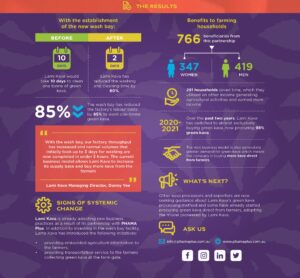FARMER’S STORY: The Brown Family in Wainunu, Bua
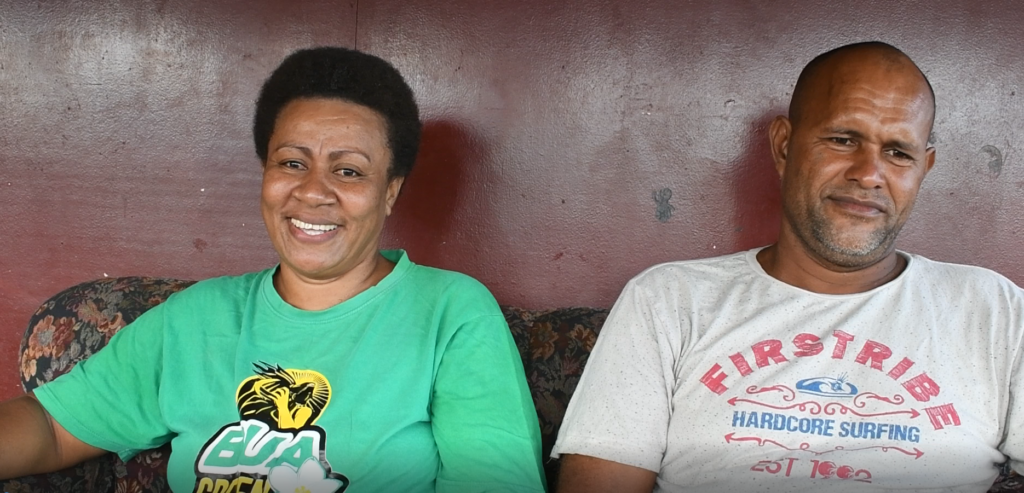
For kava farming couple James and wife Elenoa Brown, most days start before dawn. Elenoa rises early to prepare breakfast before shepherding their seven children to school, while James sets off on foot for the hour-long commute or a 15 minute boat ride from their village of Batinivurewai to the family’s kava farm nestled in the hills of Davutu, Wainunu Bua – north of Fiji.
Over 150 young men drawn from nearby communities are hired casually to help James tend to his over 10,000 kava plants. It’s tough, backbreaking work and often done under an unrelenting sun or in the rain; only ending when the sun goes down.
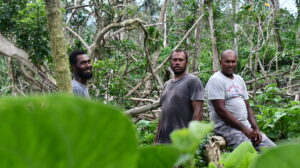
Weather dependent, it normally takes anywhere from a few days up to a few weeks for green kava to be ready for purchase by agents. This involves washing the kava in a nearby water source, peeling the outer layer and drying it in the sun or by smoking it.
“Selling dried kava takes a lot of time, energy and patience especially if there’s unfavourable weather,” James says.
PHAMA Plus supports new business model
All that changed in 2021 when Lami Kava Ltd, a Fiji-based kava processor and exporter, procured and installed a new wash bay and drying facility, shifting the entire labour intense and time-consuming post-harvest process from farmer to the factory. The introduction of this new business model was supported by the Australia and New Zealand funded-Pacific Horticultural and Agricultural Market Access (PHAMA) Plus Program.
PHAMA Plus provides support to Fiji’s kava industry by working with exporters such as Lami Kava, growers and Fijian government agencies including the Fiji Yaqona Taskforce to improve quality assurance systems and standards to ensure market access and a sustainable and profitable export industry.
Kava or Piper methysticum is an important agricultural commodity for a number of Pacific Island Countries (PICs), forming an integral part of cultural, economic and social life. It is made from a water extract of the root and/ or rhizome of the Piper methysticum shrub. The beverage is widely consumed in informal settings and for traditional ceremonies and traded as an ingredient into nutraceuticals and some pharmaceutical products. In Fiji, kava carries much social significance and economic importance raking in (AU$24m) FJ$43.6m in export earnings in 2020.
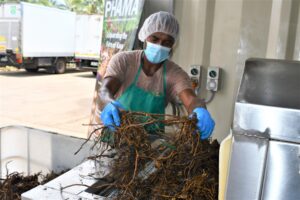
PHAMA Plus and Lami Kava partnered to build and operate a modern washing, cleaning, and grading facility which allows the company to explore potential new kava value-added products.
Lami Kava has been in the kava business for the past 40 years. Over that time as the market demand for kava of consistent quality has increased and the Fiji Kava Standards established, the company has been searching for economically viable and sustainable ways to address the highly variable quality of kava processed. Initial trials shifting post-harvest processing from the farm to the factory proved disappointing. Procuring green kava and attempting to wash and clean it with water jets proved labour-intensive and time consuming, only adding to operating costs.
“With the mechanised wash bay, our factory throughput has increased, and normal volumes that initially took up to three days for washing are now complete in under three hours,” says Lami Kava managing director Donny Yee.
The new business model is also generating greater demand for green kava which means the company is buying more kava direct from farmers.
Benefits flow to famers
While the initiative was prompted by increasing market demand for consistent high-quality kava, it has also benefited kava farming households like the Brown’s who have now found a ready buyer for their freshly harvested unprocessed green kava.
“When Lami Kava started buying only green kava, our business operations became much easier. We are really happy with the quick field-to-pocket turnaround in income generation, and we have noticed increased profits for our business as we no longer have to pay for labour associated with the washing and drying process,” said Elenoa
The Brown’s pivot to selling only green kava has also freed up valuable time that James can now use to support Elenoa in managing the family’s household and community responsibilities as well as invest in other income-generating activities, such as fishing.
The couple have been farming kava for around 30 years and have been able to build a house for their family, send their children to school and venture into other small businesses.
Now with all the benefits of being able to sell their green kava direct to the factory on harvest day, the Browns expect to be able to generate more opportunities for their family.
“This has a positive flow-on effect for our farmers in terms of time saved doing post-harvest related work which translates into reduced farm costs. They can now focus more on planting and managing their kava plantations and less on drying kava – while we manage and control the quality issues associated with the washing, drying and storage of kava,” Yee added.
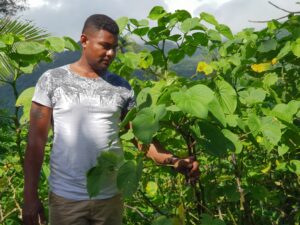
Impact assessment shows lift in farmer incomes
In May 2022, PHAMA Plus conducted an impact assessment to understand any changes in the kava farmers practice and financial and non-financial benefits from the Lami Kava partnership.
The partnership has enabled 300 kava farming households to sell green kava, reducing their harvest and post-harvest costs by 87%. Among the surveyed farmers, 97% said post-harvesting processing activities (like drying, cleaning, peeling, etc.) were no longer required. The study showed 91% of farming households earned additional income by shifting from dry kava sales to green kava by utilising the saved time in other income generating agricultural activities.
Australian opens market to Fiji’s ‘noble’ kava
Significant opportunities for the export of higher volumes of noble quality kava to Australia have also opened recently with the launch of Australia’s Commercial Kava Pilot allowing the commercial importation of kava into Australia. Under the Pilot, 114 Fijian companies have been able to export 37 tonnes of kava to Australia from December 2021 to June 2022.
The flow on from the demand of this new market is expected to benefit both Fijian exporters and local growers like James and Elenoa.
Read the full case study : Fiji’s Green Kava Revolution

